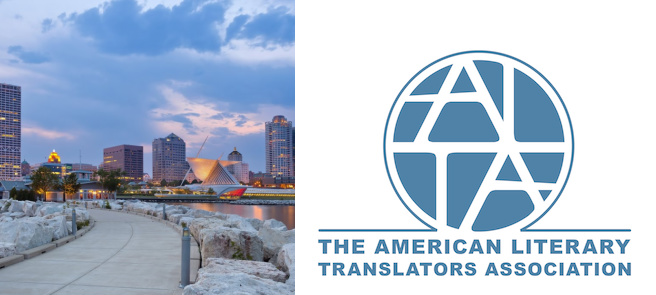I came back from the American Literary Translators Association conference with plenty of memories and anecdotes. This was my first visit to Milwaukee, and I hardly saw any of the city: that’s how appealing the panels, readings, and after-hours activities were.
I got to know the interior of the Hilton City Center pretty well as I moved from readings to panels to award ceremonies to never-ending discussions over delicious local beer. I was moved by the different styles and languages of ALTA fellows, including our former assistant editor Megan Berkobien (Catalan). I was deeply inspired by the innovation of the ongoing bilingual reading sessions, where I envisioned Scandinavian hospital scenes translated by Roger Greenwald, a Russian animal revolution translated by Tanya Paperny, and a Sophocles play by Kayne Cheshire reimagined in the American West.
But perhaps the strongest impression was made by Polish translator Antonia Lloyd-Jones. At a panel about the translator’s role in marketing his or her translations, a fellow translator recounted an instance in which her offer to assist with publicity efforts for a new book was turned down by a major publisher. Though she was well-connected and could easily secure reviews, excerpts, and public events, the publisher insisted on keeping her out of the picture.
She wanted to know why the panelists thought this was. Antonia’s answer was simple and unapologetic: unlike indie publishers or those specializing in translation, commercial publishers prefer to draw as little attention as possible to the fact that a book has been translated at all. This, the panelists agreed, was a result of one of the myths of publishing: that people don’t want to read anything that wasn’t written by a native English speaker, as if reading a translation would require the same kind of effort as following the subtitles in a foreign film.
If the translator’s identity is visible, people might notice that the book was not originally written in English, and publishers fear for the book’s chances at success. Surely, the panelists agreed, this is just a myth. But be they truths or myths, these ideas govern the way our industry looks today.
In a later conversation, Lloyd-Jones said she would encourage all translators to work toward changing the mistaken perception that reading translated books is any different than reading books originally written in English. One way of doing this, she said, is by encouraging publishers to embrace translation, rather than try to conceal it. They have the power to transform the status of translation, turning it into a selling point, and as an additional publicity tool—the translator can help promote the book through his or her unique network of colleagues and collaborators.
In a different panel titled “An Insider’s Look at the Politics of Reviewing Translations,” editors of literary journals tried to explain why there isn’t always space or means within a review to discuss the merits of a translation in addition to the quality of the book itself. Sometimes, they said, it’s best to leave that part out than to gloss over it.
Margaret Carson, co-chair of the PEN Translation Committee, stood in the back of the room. Toward the end of the panel, she raised her hand and asked the editors for a commitment: that in any given book review, they would, at the very least, make sure to include the statement “Translated by” followed by the translator’s name. If they can’t spare the space or don’t have the tools to review the translator’s work, they should, at minimum, acknowledge that a translation took place. The room erupted with applause.
This was my third time at the ALTA conference, and by now I’ve learned that the experience would be filled with friends and supporters: people who want to know what you’re working on, who give your name to publishers seeking translators, who are open-minded and curious and “get” why sometimes you come across a book that just “needs” to be available in English. But this time, I was also encouraged by the repeating attention given to ways in which we can make an innately invisible profession more visible, more known, and better understood by those outside of the industry.
Ego aside, I believe the state of literature, and especially American literature, would greatly benefit from an improvement in the status of translated works and the people behind them. Foreign cultures would become more approachable—the world would open up. Once the literary industry at-large understands translation and the importance of the translator, proper budgets and conditions would gradually fill the world with the finest renditions of the finest literature from all over the world.
To paraphrase Chad Post, of Open Letter Books, the world would be a boring place with only one kind of English. In this sense, the smaller publishing houses are light years ahead of the major, commercial ones. But I trust that everyone can catch up.
***
Yardenne Greenspan, Asymptote editor-at-large for Israel, has an MFA in Fiction and Translation from Columbia University. In 2011, she received the American Literary Translators’ Association Fellowship. Her translation of Some Day, by Shemi Zarhin, was chosen for World Literature Today’s 2013 list of notable translations. Yardenne’s translations include work by Rana Werbin, Gon Ben Ari, Nahum Werbin, Vered Schnabel, Kobi Ovadia, Yirmi Pinkus, Ron Dahan, Alex Epstein and Yaakov Shabtai. Her fiction, essays and translations have been published in Hot Metal Bridge, Two Lines, Words Without Borders, Necessary Fiction, Agave, World Literature Today, Shelf Unbound and Asymptote, among other publications. She is currently working on her first novel.

